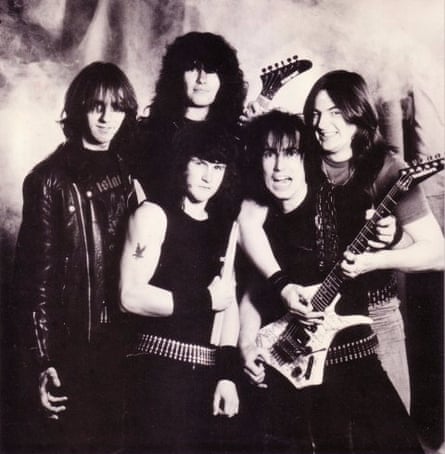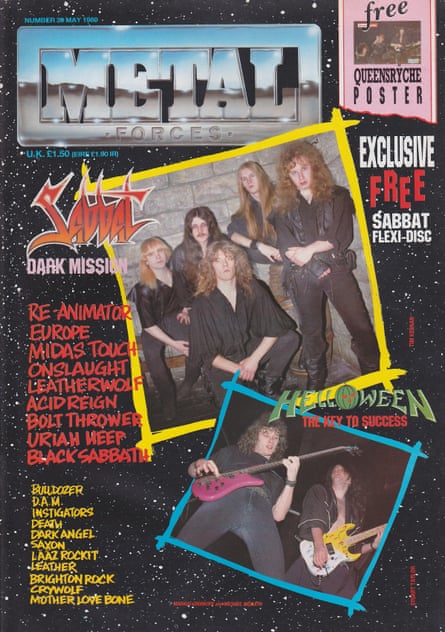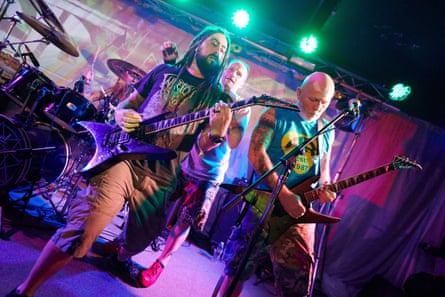‘It wasn’t an easy time in the UK, the 1980s,” says Damon Maddison, bassist with Brighton thrash metal band Hydra Vein. “There was a fair amount of anger about. The country had gone up in riots, not too many years before there was the miners’ strike, there was general strife happening everywhere. It was ripe for thrash metal.”
The high-octane subgenre tends to evoke beer-soaked denim, bloodied noses, tangled hair and Californian vocals – and Metallica, the most famous band from the US scene, remain as popular as ever with a UK No 1 album this week. But thousands of miles from the Bay Area, ex-punks and teenage metalheads from Nottingham to Bristol were making their own thrash mayhem in the mid- to late-80s, leaving Ghostbusters-themed lawsuits, police battles and haunted delay pedals in their wake.
The UK arguably invented heavy metal in the 70s with Black Sabbath, Deep Purple and Judas Priest, before reinventing it it with the new wave of British heavy metal later that decade. All the Bay Area thrashers were influenced by the savagery and speed of bands like Venom, turning the pace up even higher to punk-like tempos then adding virtuosic guitar and plenty of roared denunciation. But the British thrash bands showed up late to the party.

This compact but forceful scene was nevertheless championed by magazines such as Metal Forces, Forearm Smash, and Kerrang!, along with the late BBC Friday Rock Show presenter Tommy Vance and the shop Shades Records in Soho, plus local scenes trading tapes and zines. If the Big Four American thrashers were Metallica, Megadeth, Slayer and Anthrax, the UK’s equivalents were Onslaught, Sabbat, Acid Reign and Xentrix. Crate-digging metalheads in search of hidden thrash gems, meanwhile, should look to bands such as Hydra Vein, Slammer, Re-Animator, Holosade, Hellbastard, Metal Duck, Virus, Metal Messiah, Lawnmower Deth, Annihilated, English Dogs and DAM, who were all putting out adrenaline-charged records infused with a gritty DIY spirit.
“It all moved quickly back then, considering there were no mobile phones and no internet – it boggles my mind,” says guitarist Kristian Havard from Preston’s Xentrix, who joined the band when he was 15 and whose 18th birthday present was money to record a demo. After recording it, Xentrix’s manager told Roadrunner Records’ Mark Palmer they were putting on a gig, though there was no such thing. “We played to him in a function room above a pub. We made sure he missed his train to London so he had to watch it. The next day, they offered us a deal.”
Equally wet behind the ears was Nige Rockett, guitarist with Onslaught (from Bristol), who recalls travelling Britain as a teenager with a friend, sleeping rough and attending all the Discharge, Exploited, and Charged GBH shows they could find before deciding to form a band themselves. “The snag was we couldn’t play any instruments,” he says, before he recruited the late Vice Squad guitarist and Riot City Records owner Dave Bateman to teach him. “He showed me all the necessities I needed to make some basic noise. We all started from there – four of us, all from the same school.”
From their first show on the outskirts of Bristol, which was shut down by police after 15 minutes and ended with a 200-person brawl, the band quickly scored a record deal and released debut Power from Hell. “Everything snowballed from there,” Rockett says, and not long afterwards, Onslaught were supporting one of their major influences, Motörhead, on tour. It was around this time the band members were haunted by the number 666 appearing mysteriously on delay pedals and other equipment. “As much as people think it’s a made up story, it’s 1,000% true – and it freaked us out,” says Rockett.
Along with heavy metal’s most prolific mascot, Satan, Nottingham’s Sabbat also introduced a markedly more folkloric English paganism into their lyrical themes and promo materials – even posing in front of Stonehenge to promote an album. They were teenagers, too, when they adopted their pagan aesthetics from a book one of the band members’ mums owned about witches; they quickly scored a record deal with German label Noise International, becoming one of the UK’s most formidable thrash bands.
They occasionally courted controversy among local religious groups, although they sometimes cannily manufactured it themselves. “We’d write to the local papers and complain about us,” says guitarist Andy Sneap, who is now a prolific metal producer (and guitarist for Judas Priest), who has ended up engineering many of the thrash bands that influenced Sabbat.
Unlike the sometimes po-faced American bands, British thrashers had a predisposition for self-deprecation and adolescent irreverence, and may have seemed more concerned with getting up the nose of the music industry than making a mint. Sometimes it may have harmed their chances of success outside the UK as with the Pythonesque themes on Metal Duck’s Quackcore. At other times it caused criminal damage, as when Warfare, playing an impromptu set outside a Metallica gig to protest the huge costs for an official support slot, finished up by smashing their truck into seven parked cars. At other times, though, it paid dividends – as when Xentrix released a cover of Ray Parker Jr’s Ghostbusters, spurred on by a well-received performance on the Tommy Vance rock show. Just after Ghostbusters 2 hit the cinemas, the single quickly drew the litigious ire of Columbia Records for its artwork featuring the Stay Puft Marshmallow Man giving the finger (although perhaps not as quickly as Disney intervened with the name of UK band Bomb Disneyland).
“We did the Ghostbusters thing because we didn’t have any songs to do, so we were messing around with this cover,” says Havard, who was lumbered with loads of stock featuring outlawed artwork. “We just threw them out. I really wish I’d kept a box for myself, because I’d be rich beyond my wildest dreams. People still rip themselves to shreds trying to get hold of them.”
Thrash piss-takers Lawnmower Deth – with songs called Spook Perv Happenings in the Snooker Hall and Did You Spill My Pint? – were an “extraordinary lie that turned into a real thing”, says Qualcast Koffee Perkulator Mutilator, otherwise known as vocalist Pete Lee. Bandmate Chris, frustrated with his old group Scrawm, decided to put out the most ridiculous ad he could think of in Kerrang! along with a photo and a list of fake gigs, but when the ad actually created buzz, he had to follow up with another letter, saying he was unable to do the shows because he couldn’t find any “suitably sick and perverted backing musicians”.
“He was in an absolute panic because he thought he was going to get killed or something because of this massive lie” about the gigs he’d promised, adds Lee. “We found out about this, and we had a like-minded friend, the bass player in Sabbat, who knew who he was. From there we got in touch with him and said, do you want to do it for real?”
after newsletter promotion
But as the 80s faded into the 90s and the new wave of grunge bands began to take hold, it looked as if thrash was at risk of becoming a relic of the past – an 80s curiosity along with spandex, mullets and Reagan. Sabbat’s Sneap recalls that music journalists were told to forget metal; it’ll be grunge bands on the cover now. In the UK, it was over almost as quickly as it started.
“We got on the cover of Kerrang! and Metal Hammer but it didn’t amount to much financially,” Sneap says. “Anything we did was always really hard work. We were 18, 19, 20 – it was uncharted waters. By the time we were doing the second album, the wheels were coming off a little bit; management didn’t look after the finances properly. We were basically trying to recoup money to pay debts off that we’d been left with.”
So despite their success and influence, Sabbat always seemed like a struggle, Sneap says. “I’m proud of what we did, and I met a lot of people I’m still really good friends with,” he adds, but says the UK bands couldn’t have gone any further.
“We were all trying our best, desperately clawing, trying to get to a professional level. I just don’t think we quite had it, really; I think the American bands that are still going had a bit more about them. American bands had places to rehearse; it was seen more as a profession. Even when we were at a certain level, it was still seen as a part-time thing almost. We never earned enough money to pay the band a wage.”

Meanwhile, recalls Mike Exley, a journalist for Metal Forces who closely covered thrash at the time, London promoters were putting on thrash legends such as Testament, Exodus, and Flotsam & Jetsam, sometimes in the same week. “All the UK bands had to work very, very hard” to compete at a time when Metallica tickets were a fiver, Exley says.
“As the crest of the wave was breaking, the UK ended up washed up on the shore, with some great records, but no audience,” says Ian Glasper, music historian and author of UK thrash compendium Contract in Blood. While Megadeth, Metallica and Slayer were in “the right place at the right time”, he says, UK thrashers “were in the wrong place at the wrong time”. Seeing the success of the US Big Four, UK labels wanted homegrown versions – but Glasper says they were often dropped when they failed to sell out arenas or shift the same immense number of records. “There was a feeding frenzy by major labels. Everyone wanted their token UK thrash band, and then when they got one, they didn’t know what to do with them.”
Then something stirred in the new millennium. “When thrash went away, it was seen as done – it’s never coming back,” says Ol Drake, guitarist for Huddersfield thrash revival band Evile, who started out playing Metallica cover songs but, along with bands such as Dallas’s Power Trip, Denver’s Havok, Virginia’s Municipal Waste, and Gama Bomb from Newry, Northern Ireland, helped yank thrash from the 80s into the early noughties with the energy of a speed metal solo. “We didn’t really know of anyone who was doing thrash metal – when we started writing our own stuff, people would say: what are you doing? Thrash is dead.” Evile’s success proved that was far from the case; with critically praised albums they and others resuscitated the genre through brute force.
Now, with a Stranger Things cameo propelling the Metallica classic Master of Puppets into the Billboard charts and even traditionally poppier groups such as Foo Fighters and the comically varied Australians King Gizzard and the Lizard Wizard getting in on the act, a new generation of zoomers are loving the likes of Metallica’s recent single Lux Aeterna, with its opening riffs that bolt from zero to 100mph. “I fully take credit for Metallica’s return to thrash,” jokes Ol Drake.
The revival Evile helped spearhead “cemented the fact that bands that weren’t in the 80s are allowed to play thrash now,” says Drake, and it continues today: just look at YouTube channel New Wave of Old School Thrash Metal and you’ll find hundreds of bands tapping into the classic thrash sound. British bands Hellripper, Bangover and Inhuman Nature lean into both the aesthetics and the sound of those 80s pioneers, Ed Repka-influenced artwork and all. The hardcore punk scene, meanwhile, is producing ferocious “crossover thrash” bands such as Leeds’ Pest Control, Cardiff’s Asidhara, Falmouth’s Rash Decision, and Pizza Tramp from Caldicot. In the wake of Stranger Things, “the kids all want to learn Master of Puppets now”, says Ben Taylor, lead guitarist of Inhuman Nature, who also teaches guitar.

With the internet exposing more people than ever to the pummelling high-tempo drumbeats and rapid-fire palm-muting of the old school thrashers and their offspring, there’s not only a hunger for new thrash blood – the UK’s original thrashers are playing again too. Albeit with occasionally differing lineups, bands including Xentrix and Acid Reign are putting out new records and playing festivals again; Onslaught even shared a strange billing in China with Backstreet Boys at the Changjiang International Music Festival 2016.
“We followed a world-renowned Chinese classical pianist with the audience throwing flowers on stage,” Nige Rockett says. “We sent fake lyrics” – because the festival organisers vetted the bands – “and there were all these police and soldiers surrounding the stage. Then as we hit the first note, the crowd went nuts, people were crowd-surfing, there were pits, and all the soldiers and the police were going mental.”
Brighton’s Hydra Vein, meanwhile, only played five gigs before breaking up, but released a new record in 2022. “We’re in tough times again for a lot of people – there’s volatility again, and every time the world is a little bit rough, I think it’s natural people find themselves drawn to aggressive, angry music,” Maddison says. “That’s certainly what thrash metal always was.”
Stay connected with us on social media platform for instant update click here to join our Twitter, & Facebook
We are now on Telegram. Click here to join our channel (@TechiUpdate) and stay updated with the latest Technology headlines.
For all the latest Music News Click Here
